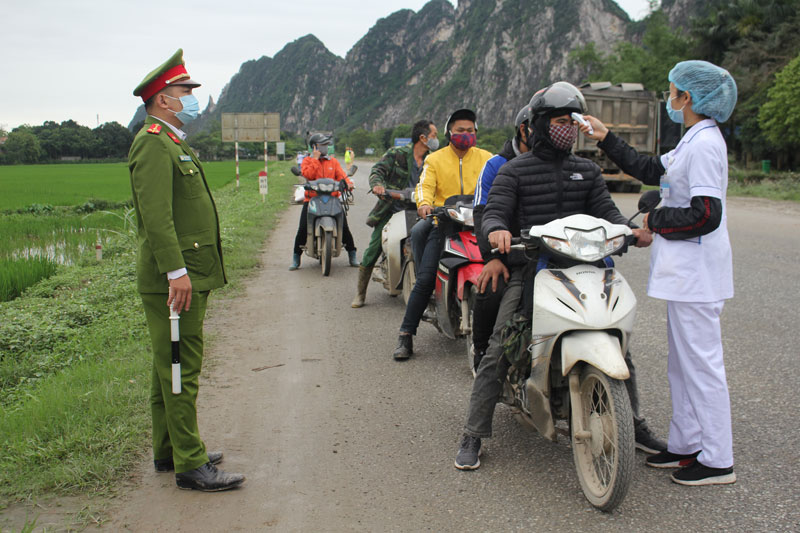
(HBO) – Hoa Binh’s police forces have cooperated with relevant authorities to set up checkpoints on main streets to conduct screenings on people and vehicles crossing the province as part of preventive measures against the spread of the COVID-19 pandemic.
The move came following the Prime Minister’s Directives No.
15 and 16 as well as documents issued by the Minister of Public Security and
Chairman of the provincial People’s Committee on enforcing a series of
stringent measures to combat the outbreak.
 A medical worker checks body temperature of people passing through a
checkpoint in Lien Son commune, Luong Son district.
A medical worker checks body temperature of people passing through a
checkpoint in Lien Son commune, Luong Son district.
A total of 143 people, including policemen, military
officials, health workers and traffic inspectors, have been deployed to watch
at 11 checkpoints across different roads in the province, said Colonel Trinh
Van Cuong, Deputy Director of the provincial Police Department.
They have been tasked to examine identity of people and
origin of vehicles and goods coming in and out in order to prevent suspected coronavirus
infections from entering the province.
They have also conducted checks on people with suspected
signs of smuggling, speculation, illegally hiking prices or producing fake
goods to profit from the pandemic.
At the same time, they have kept a close watch on coaches,
buses, taxis and other vehicles after a ban of public transportation.
They are responsible for checking body temperatures of
people crossing the roads and requesting them to fill out health declaration
forms while reporting on any suspected infection to local medical centres./.
The Standing Board of the Hoa Binh provincial Party Committee has agreed in principle on a proposal by the Standing Board of the Party Committee of Hoa Binh city to gather feedback on the city’s 1:2000 zoning plan, which forms part of its broader urban development strategy.
Hoa Binh province has made notable progress in public administration reform and digital government development, with the satisfaction index among citizens and businesses reaching over 84%, according to recent government evaluations.
Thanks to great efforts by local authorities in recent times, the governance and public administration performance of Mai Chau district has been significantly improved.
In the afternoon of June 6, the Party Committee, the People's Council, the People's Committee and the Fatherland Front of Lac Son district solemnly held a meeting to celebrate the 139th anniversary of the district's founding (1886–2025) and the 79th anniversary of the establishment of the district's Party Committee (1946–2025). There was the attendance of Mr. Bui Van Thang, the Vice Chairman of the Provincial People's Council; Mr. Quach Tat Liem, the Vice Chairman of the Provincial People's Committee; Ms. Dang Bich Ngoc, the Deputy Head of the National Assembly Delegation of the province; as well as the former leaders of the province and district through various periods, who are the natives of the district.
Implementing the Politburo’s Resolution No. 57-NQ/TW on breakthroughs in science – technology, innovation, and digital transformation is a golden opportunity for the northern mountainous province of Hoa Binh to renew growth model, improve competitive edge and shorten digital gap.
Resolution 57-NQ/TW, issued by the Politburo on December 22, 2024, identifies sci-tech, innovation, and digital transformation as strategic breakthroughs to build a developed and prosperous nation. In Hoa Binh province, this spirit is not just a slogan, it’s being put into action through concrete initiatives that form a "new development triangle”: digital citizenship, digital economy, and digital administration.



 A medical worker checks body temperature of people passing through a
checkpoint in Lien Son commune, Luong Son district.
A medical worker checks body temperature of people passing through a
checkpoint in Lien Son commune, Luong Son district.